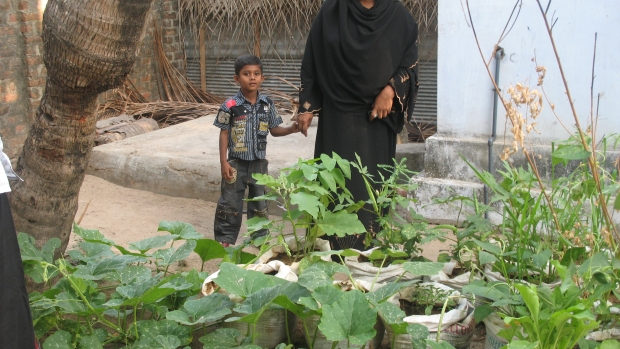Grants :: Small Grant Facilities :: Home gardening in the Pottuvil coastal belt
Home gardening in the Pottuvil coastal belt

Home gardening by fisher ladies , Pottuvil, Sri Lanka © Kumudini Ekaratne, IUCN, 2012
Objectives
- Increasing the monthly income of housewives in Pottuvil
- Growing more vegetables, yams, fruits and leaves at a home-garden level
Background
After the cessation of the civil unrest in the eastern coast of Sri Lanka, there has been a rapid thrust of development in the area and increasing population pressure resulting from returning refugees. This has resulted in shortages of essential items such as vegetables, fruits and other foods.
The majority of the coastal community in the selected area were Muslims. The men engage in small-scale paddy cultivation or lagoon fisheries. The average monthly income for selected households was very low — just 2,500-4,500 LKR (~18-34 USD) — indicating that these households are merely eking out a living. (The official poverty line for the Amparai District is 3,642 LKR or 27.5 USD.)
There is also a high dependency among coastal communities on natural resources — such as of mangrove products and fish from the Lagoon — resulting in overexploitation of these resources. As a solution to both these issues of shortages of essentials and overexploitation of resources, this project aims to increase food availability, increase household income and reduce pressure on natural resources.
Interventions
• A survey of the community was conducted by the grantee, assessing, inter alia, family sources of income, monthly saving, and nutrition levels of children.
• Fifty women from the Muslim community in the area were selected for training and mobilized.
• Women were supplied with mammoties, watering cans, polythene sacks, seed packets and soils.
• Seeds provided included brinjals (aubergines) green chillies, cucumber, lady’s fingers (okra) and tomatoes.
• Two workshops were held for the selected women to develop skills related to home gardening: preparation of nurseries; budding plants; controlling pests; and post-harvest techniques.
• Another two workshops were held to teach these women composting techniques. All these workshops were conducted by trained agriculture specialists.
• Women were taught to cultivate vegetables in large bags, thus reducing the need for excessive water. This process is called ‘bag culture’.
• Two mobile vegetable stalls were provided to the beneficiaries
Target beneficiaries
50 women from Pottuvil.
Outputs
50 home gardens.
Accomplishments and challenges
- Children are now fed balanced meals with vegetables grown in their home gardens
- Each beneficiary now earns an extra 2,500 LKR (18 USD), on average, each month. This additional money is saved and the project is resulting in inculcating a habit of saving among the beneficiaries.
- The beneficiaries harvested vegetables on three occasions during the project duration. Twenty percent of the harvested crops were used for home consumption and the balance was sold.
Contributions to cross-cutting themes
All direct beneficiaries are women.
Lessons Learned
- The project has shown the effectiveness of bag culture for dry zone farming, where rainfall is scarce for part of the year.
- Close monitoring is essential for successful project implementation.
- The support and guidance of government officers is also crucial for the success of the project.
Project Facts
Country
Location
Pottuvil
Topic
Duration
1st May 2011 to 30th Apr 2012
MFF Grant Amount
LKR 531,000.00
Implementing Partner
Mr H. P. PiyathissaWanasarana Thurulatha Swetchch Society58/2 , Abdul Rahim HouseMuhudu Vihara RoadPottuvilTel: + 94 71-6216642Wtss46@yahoo.com"We have never practivced home gardening before. I am now able to provide fresh vegetables and fruits to my family. The extra income from sales of surplus is saved in children's bank accounts" Mrs Raheem